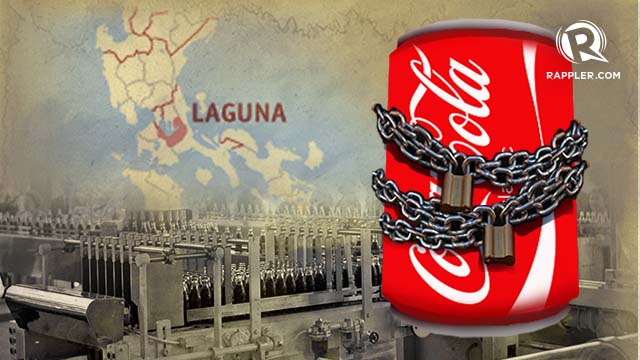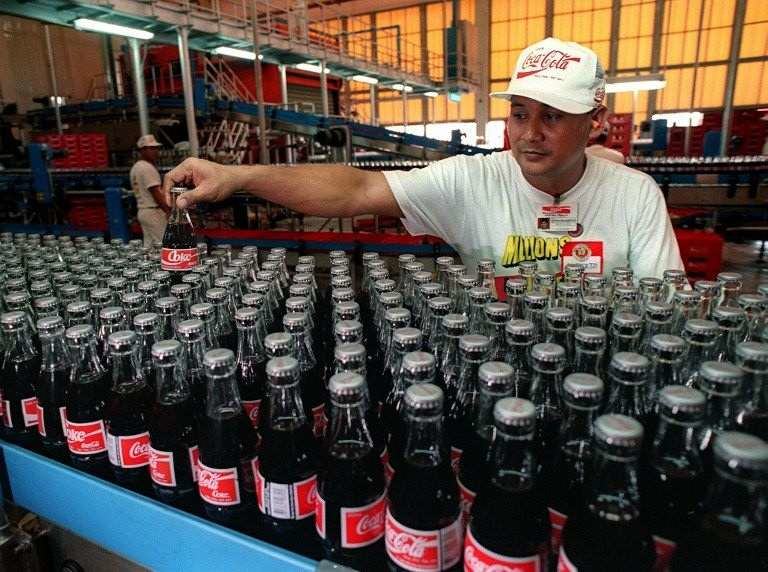SUMMARY
This is AI generated summarization, which may have errors. For context, always refer to the full article.

MANILA, Philippines (UPDATED) – Coca-Cola is ending its concentrate plant operations in Laguna, one of the key manufacturing activities of the global giant in the Philippines.
The other facilities, including the expanding bottling operations nationwide, will remain and will benefit from a move meant to make the supply and distribution chains more efficient, Adel Tamano, vice president for public affairs of Coca-Cola Exports Corp, the brand owner, confirmed with Rappler in a phone interview on Monday, March 4.
After much deliberation, Tamano said the concentrate plant is best done in Singapore “due to efficiencies, which are crucial in efforts to succeed.”
Editor’s note: We earlier reported that the closure affects Coca-Cola’s Philippine operations. Only the Canlubang plant — one aspect of the local manufacturing and supply chains — is affected by the changes. We regret the error.
The local unit has been expanding its bottling operations in the Philippines as part of a multi-year $1-billion investment commitment and, according to Tamano, an efficient supply chain is crucial in it.
The concentrate plant is part of the regional supply chain, and was part of the manufacturing and distribution chains in the Philippines. Manufacturing the product involves raw materials like water, sugar, and others, which are then distributed to bottling plants next to key retail markets in the country.
The closure will affect 57 direct employees of the factory in the Canlubang industrial strip. Tamano said the 22 bottling operations of Coca-Cola Bottlers Philippines, Inc. (CCBPI) nationwide still employ about 8,000. CCBPI is the local franchise holder.
“It’s always sad to let people go,” Tamano said, adding that the affected employees either retired or moved to other manufacturing plants.
CCBPI has been operating in the Philippines since the start of the 20th century and has been locally producing Coca-Cola products since 1912. The Philippines was the first Asian country to have a Coca-Cola bottling and distribution franchise.
This new move is an addition to 3 landmark events in Philippine business.
Global business
One, this recent decision affecting the local operations and strategic future of CCBPI seals the business reality that it is subject to the changing global corporate landscape of beverage giant Coca-Cola Company.
The mergers and consolidation efforts at the parent company level over the recent decade have led to several ownership changes in the local unit.
In December 2012, control of CCBPI was transferred from the Atlanta-based parent to Coca-Cola FEMSA S.A.B. de C.V., the Mexico-based largest independent Coca-Cola bottler in the world. The cash deal valued the local bottler at $1.35 billion.
CCBPI used to be a unit of local conglomerate San Miguel Corp., which has since diversified away from its food and drinks portfolio. San Miguel sold, then re-acquired, CCBPI from Australia-based Coca-Cola Amatil Limited, which had operations in Asia Pacific and Eastern Europe.
The CCBPI deal was among Coca-Cola FEMSA’s first acquisition beyond Latin America. The Mexican firm first announced its intention to acquire a stake in the Philippine operations in February 2012.

Manufacturing edge
Two, global manufacturers have been moving out of the Philippines in past decades to other Asian countries offering lower cost and logistical efficiency.
This comes at a time when Philippines, a rising star in Asia with phenomenal growth, is attracting more investors, including those from the industry sector.
In January 21, Coca-Cola FEMSA chief executive officer Carlos Salazar Lomelin made a courtesy call to President Benigno Aquino III to affirm the new owners’ commitment to the Philippines.
“We had the privilege to express our firm belief and confidence in the Philippines to President Benigno Aquino III himself, looking forward to a successful relationship with the Philippine government,” Lomelin was quoted as saying.
In a previous statement, the Mexican bottler said it will “leverage its strong culture of social development, its proven know-how and operating capabilities in the Philippines.”
The deal was then considered a “vote of confidence” on the Philippine economy, which grew 6.6% in 2012, one of the fastest in the world.
“The Philippines provides a unique opportunity to operate in a country with very attractive economic growth prospects, a private consumption-driven economy, an attractive socio-economic and demographic profile, and a cultural resemblance to Latin America,” Coca-Cola FEMSA had said in a briefing paper.
It noted that food and non-alcoholic beverages account for 42% of private consumption in the Philippines. It also described the Philippines as a market that has “fast growing non-alcoholic beverage industry” with a “complex retail landscape.”
Tamano said CCBPI had opened a new bottling plant in Misamis Oriental, which he described as “the most advanced in Asia.”
CCBPI also has a Laguna bottling plant in Sta. Rosa town, close to the concentrate plant in Canlubang industrial strip.

Sin taxes
The move also comes months after the Philippines’ historic decision to reform its sin tax structure.
After 15 years, the sin tax reform law, which increased the excise tax on sin products, like tobacco and alcohol, was enacted in 2012.
The legislative measure, highlighted as a health-related move more than revenue-related, was implemented January 2013.
Some sectors, citing the health reasons, have been calling for review of taxes imposed on softdrinks, too.
Tamano said the decision to re-structure the supply chain in Asia came before the recent sin tax reforms in the Philippines.
CCBPI is among the top 100 corporations in the Philippines and among the biggest taxpayers. – Rappler.com
Add a comment
How does this make you feel?
There are no comments yet. Add your comment to start the conversation.